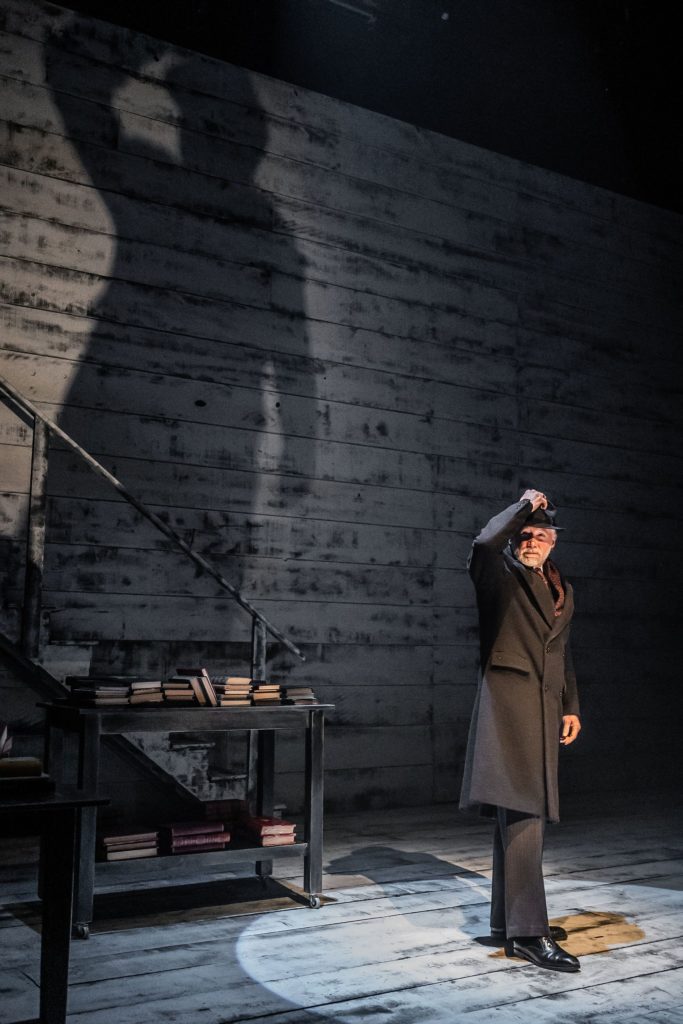Live and in person at the Theatre Centre, Toronto, Ont. as part of Why Not Theatre’s RISER, Toronto. Until April 10, 2022

Written and performed by Neha Poduval and Himanshu Sitlani
Directed and sound design by Miquelon Rodriguez
Set and costumes by Jung-Hye Kim
Lighting by André du Toit
An IMM-Permanent Resident is a bracing, funny, gut-twisting tale of the three-year effort of writers/performers Neha Poduval and her husband Himanshu Sitlani to secure Permanent Resident status for Neha in Canada.
Both Neha and Himanshu were from Mumbai, India (well Neha was born in Mumbai and Himanshu moved there with his family from Qatar, a point she always teases him about). Himanshu moved to Canada when he was an adult, for a better life. When he returned to India for an extended stay he met and fell in love with Neha; married and then moved to Canada with her. This started the process of changing her visitor’s visa into Permanent Resident Status. The required paperwork was arduous, frustrating and almost ‘Kafkaesque’. Mountains of forms had to be filled out three times because either information was not forthcoming or documentation was misplaced—by the visa officials.
Both Neha Poduval and Himanshu Sitlani have created a production that includes meeting the future in-laws; dealing with their scrutiny and suspicion; dealing with the disappointment of a parent (mother!!) who can’t understand why her son needs to marry anybody since she (the mother) is so attentive to her son etc. There is family on both sides who are hurt that their loved ones want to move to Canada. It’s one of the many beauties of An IMM-Permanent Resident that the stories of overly protective parents in India have such resonance for many other cultures that also have such ‘protective’ parents. And of course anyone who has had to wrangle with the tangled world of immigration will find resonance in the play.
Neha and Himanshu have created the story of a loving couple who had its rocky moments once they moved to Canada. He had a night job as a security guard and of course needed the low-paying job to pay their bills. But Neha couldn’t sleep if Himanshu wasn’t there. There was an ultimatum to find another job. Tensions were high. The couple argued, often in Hindi and other Indian dialects. The performances are so full of conviction and commitment that it’s not necessary to have a translation of what they say because we sense the frustration on both sides.
Jung-Hye Kim has created a set of suitcases in which are various props and clothes for the scenes. Also arranged around the playing area are piles of papers, forms, applications etc. There is a stage at one end of the space that is reinforced boxes on which to sit or stand. Because this was a “relaxed performance” André du Toit’s lighting was ‘heightened’ to provide illumination in case a person needed to leave in the middle. At the beginning of the show, both Neha and Himanshu carefully read the various efforts that were made to make the audience feel comfortable during this relaxed performance. That care and consideration is part of the embracing nature of the piece and the artists who created it.
Director Miquelon Rodriguez is making his directorial debut and it’s assured. He uses the space well and negotiates his two actors so that the audience, which is on three sides of the space, get a good sense of the performances etc.
While the show details the many and various frustrations that Neha and Himanshi endured, often with heartache but also wonderful humour, in trying to navigate the mind-boggling immigration process, this was only one part of the couple’s difficulties. Miquelon Rodriguez provides the following paragraph in the program to illustrate:
“Third time’s the charm.
It’s the phrase that we’ve been saying throughout the multi-year long process of developing this script and this show. And it couldn’t be more fitting. It took three attempts to put up a full staged reading of this incredible play during the development phase at Factory Theatre. It took three RISER Project cycles throughout this ongoing pandemic to get you in the seat to read this very note today. It took the playwrights three years, filling out three full rounds of the same immigration paperwork, to get Neha’s Permanent Resident status (Spoiler/not spoiler). “
Neha Poduval and Himanshu Sitlani endured all this and more with tenacity, guts, resolve, determination, humour and their love. Any country should/would count itself lucky to have such citizens.
Produced by Nautanki Bazzar.
Running until April 10, 2022.
Running time: 75 minutes, no intermission.
{ 0 comments }

 INDUSTRY SERIES SIGN-UP NOW OPEN This year’s
INDUSTRY SERIES SIGN-UP NOW OPEN This year’s 